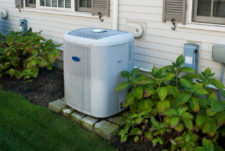Blog
6 Things to Consider When Purchasing a New HVAC System
 A home’s HVAC system is not something most people spend time thinking about, except when it needs maintenance or repairs, or it needs to be replaced. When choosing a new furnace and/or air conditioner, start by selecting a NATE-certified HVAC professional with years of experience and good reviews, such as Indoor Air Quality. Your HVAC contractor will be able to help you select the best system for your home, based on its size and characteristics, as well as your comfort and budget concerns.
A home’s HVAC system is not something most people spend time thinking about, except when it needs maintenance or repairs, or it needs to be replaced. When choosing a new furnace and/or air conditioner, start by selecting a NATE-certified HVAC professional with years of experience and good reviews, such as Indoor Air Quality. Your HVAC contractor will be able to help you select the best system for your home, based on its size and characteristics, as well as your comfort and budget concerns.
Here are 6 Things to Consider When Purchasing a New HVAC System:
1. Heating Size, Capacity, and Type
Heating system capacity is measured in BTUs (British Thermal Units). A BTU is the amount of heat needed to raise a pound of water by 1 degree Farhenheit. Input capacity measures the amount of gas burned and output capacity is how much usable heat is generated. Some energy is lost in the process (meaning it doesn’t contribute directly to generating heat) so the ratings reflect energy efficiency, but it is important to know whether you are looking at input or output. Newer units are more efficient and have smaller input BTU ratings. Generally, the higher the BTU rating, the greater the heating capacity.
Another important measurement is cubic feet per minute (CFM). This is how many cubic feet of air can pass by a fixed point per minute, and is necessarily for properly calculating the right capacity for your HVAC system. Your HVAC contractor can properly measure and choose the best system to meet your needs.
2. Cooling Size, Capacity and Type
The cooling capacity of air conditioners is measured by ton, which has nothing to do with weight. One ton is equal to about 12,000 British Thermal Units Per Hour (BTUh). As with heating systems, choosing cooling capacity based on the size and needs of your home is critical and it is important to work with a knowledgeable, reputable HVAC professional to make that assessment.
3. Energy Efficiency
According to the U.S. Department of Energy, heating and cooling account for about half of a home’s energy use, so the energy consumption of your new HVAC system is worth careful consideration. Most experts recommend purchasing the most efficient system you can afford, keeping in mind the cost savings you will realize throughout the life of the system in terms of monthly energy savings. Start by looking for systems that have an Energy Star rating, as these will be the most efficient. Then look at the individual ratings. Furnaces are measured by Annual Fuel Utilization Efficiency (AFUE). The higher the AFUE, the more efficient the furnace is. Air conditioners are measured by Seasonal Energy Efficiency Ratio (SEER). The higher the SEER rating, the more efficient the air conditioner is.
In order to achieve the stated efficiency rating, be sure to have your system sized and installed by a qualified HVAC technician and schedule annual maintenance.
4. Noise Levels
Today’s HVAC systems have made great strides in terms of quiet operation, but you should still check the noise level before making a decision on a particular system. Noise levels are measured in decibels (db). Ask the manufacturer and your installer about the noise levels of the systems you are considering. Look for systems that are under 60 decibels.
5. Maintenance
Find out what maintenance is required. Properly maintaining your new system is vital to its long-term performance, so be sure to understand what you need to do to keep the system running well and keep the manufacturer’s warranty in effect. One of the simplest ways to manage maintenance tasks is by signing up for an HVAC maintenance plan. And change the air filter every 30-90 days!
6. Indoor Air Quality
If indoor air quality is a concern due to allergies, other respiratory issues or simply comfort, ask your technician about effective ways to improve the air quality in your home. Solutions, such as better air filters, air purification systems, humidification control and ventilation products, are available. Discuss your needs with your contractor before any work begins.
How Indoor Air Quality’s Process Works
When you purchase a new HVAC system from IAQ, we start by scheduling an appointment for a project specialist to go out to evaluate your home and your needs in order to determine the ideal equipment choice. The specialist will perform an engineering load analysis which determines the heat loss and gain to ascertain the proper system size.
The load analysis includes assessing the size of the windows, the number of doors and the direction that each wall of the house faces. Next we make an estimate of the amount of insulation. We also look at whether the house is on a slab or crawlspace and whether there is an attic. We use all the data we collect to calculate the appropriate system size for your home.
Then we look at your home’s engineering and make any necessary adjustments, based on whether your house can accommodate a high efficiency furnace, a standard efficiency furnace or a heat pump. We work with you to prioritize all the relevant parameters such as operating cost, initial investment or high efficiency.
Lastly, we help you navigate all the possible options that will work best for your family’s needs.
There are a lot of choices when it comes to a new HVAC system. IAQ is here for you every step of the way through the selection and installation process. Contact us today! We serve homes in Highlands Ranch and throughout the Denver metro area.












